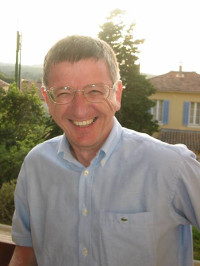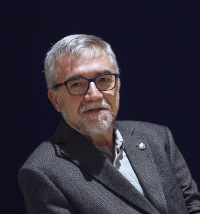Keynote Speakers
- Michel Raynal (IRISA, University of Rennes)
(Wednesday, morning)
Talk title: Concurrent Systems: Hybrid Object Implementations and
Abortable Objects
Slides: Download here
- Mateo Valero (UPC Barcelona) (Thursday, morning)
Talk title: Runtime Aware Architectures
Slides: Download here
- Christian Scheideler (University of
Paderborn) (Friday, morning)
Talk title: Self-stabilizing distributed data structures
Slides: Download here
Michel Raynal
Title: Concurrent Systems: Hybrid Object Implementations and Abortable Objects Time & Place: Wednesday, 09:00 - 10:00, lecture hall EI 7Abstract
As they allow processes to communicate and synchronize, concurrent objects are, de facto, the most important objects of concurrent programming. The talk will present and illustrate two important notions associated with such objects. The first one, which is related to their implementation, is the notion of a hybrid implementation. The second one, which is related to their definition, is the notion of an abortable object.
Roughly speaking, a hybrid implementation of a concurrent object is such that the algorithms implementing its operations do not use locks in "good circumstances", those being defined statically or dynamically. In particular the use of locks must be prevented in concurrency-free execution patterns.
The notion of an abortable object is related to the object definition itself. It addresses the case where, in practice, conflicts are rare. So the idea is here to allow a process that invokes an object operation, to return a predefined default value (abort) in specific circumstances, namely in the presence of concurrency. To illustrate this, the talk will present a non-blocking implementation of an abortable stack (non-blocking means here that, in the presence of concurrency, at least one stack operation does not return abort).
Bio

Michel Raynal is a Professor of computing science, IRISA, University of Rennes, France. His main research interests are the basic principles of distributed computing systems. He is a world leading researcher in distributed computing, and the author of numerous papers on this topic (more than 140 in int'l scientific journals, more than 300 papers in int'l conferences). He is also well-known for his books on distributed computing.
Michel Raynal chaired the program committee of the major conferences on the topic (e.g., ICDCS, DISC, SIROCCO, OPODIS, ICDCN, etc.) and served on the program committees of more than 180 int'l conferences including all the most prestigious ones. He is the recipient of several "Best Paper" awards (including ICDCS 1999, 2000 and 2001, SSS 2009 and 2011, Europar 2010, DISC 2010, PODC 2014) and has supervised more than 45 PhD students. He is also the winner of the 2015 Int'l Award "Innovation in Disitributed Computing" (also known as SIROCCO Prize). He gave lectures on distributed computing in many universities all over the world. In the recent past, Michel Raynal has written four books: "Communication and Agreement Abstractions for Fault-Tolerant Asynchronous Distributed Systems", Morgan & Claypool 251 pages, 2010 (ISBN 978-1-60845-293-4); "Fault-Tolerant Agreement in Synchronous Distributed Systems", 165 pages, Morgan & Claypool, September 2010), (ISBN 978-1-60845-525-6); "Concurrent Programming: Algorithms, Principles and Foundations", Springer, 515 pages, 2012 (ISBN 978-3-642-32026-2), and "Distributed Algorithms for Message-passing Systems", Springer, 510 pages, 2013 (ISBN: 978-3-642-32026-2). Since 2010, Michel Raynal is a senior member of the prestigious "Institut Universitaire de France".
Mateo Valero
Title: Runtime Aware Architectures Time & Place: Thursday, 09:00 - 10:00, lecture hall EI 7Abstract
In the last few years, the traditional ways to keep the increase of hardware performance to the rate predicted by the Moore's Law have vanished. When uni-cores were the norm, hardware design was decoupled from the software stack thanks to a well defined Instruction Set Architecture (ISA). This simple interface allowed developing applications without worrying too much about the underlying hardware, while hardware designers were able to aggressively exploit instruction-level parallelism (ILP) in superscalar processors. With the irruption of multi-cores and parallel applications, this simple interface started to leak. As a consequence, the role of decoupling again applications from the hardware was moved to the runtime system. Efficiently using the underlying hardware from this runtime without exposing its complexities to the application has been the target of very active and prolific research in the last years.
Current multi-cores are designed as simple symmetric multiprocessors (SMP) on a chip. However, we believe that this is not enough to overcome all the problems that multi-cores already have to face. It is our position that the runtime has to drive the design of future multi-cores to overcome the restrictions in terms of power, memory, programmability and resilience that multi-cores have. In this talk, we introduce a first approach towards a Runtime-Aware Architecture (RAA), a massively parallel architecture designed from the runtime's perspective.
Bio

Mateo Valero is professor at the Computer Architecture Department at UPC, in Barcelona. His research interests focuses on high performance architectures. He has published approximately 600 papers, has served in the organization of more than 300 International Conferences and he has given more than 400 invited talks. He is the director of the Barcelona Supercomputing Centre, the National Centre of Supercomputing in Spain.
Dr. Valero has been honoured with several awards. Among them, the Eckert-Mauchly Award, Harry Goode Award, The ACM Distinguish Service award, the "King Jaime I" in research and two Spanish National Awards on Informatics and on Engineering. He has been named Honorary Doctor by the Universities of Chalmers, Belgrade and Veracruz in Mexico and by the Spanish Universities of Las Palmas de Gran Canaria, Zaragoza and Complutense in Madrid . "Hall of the Fame" member of the IST European Program (selected as one of the 25 most influents European researchers in IT during the period 1983-2008. Lyon, November 2008)
Professor Valero is Academic member of the Royal Spanish Academy of Engineering, of the Royal Spanish Academy of Doctors, of the Academia Europaea, and of the Academy of Sciences in Mexico, and Correspondant Academic of the Spanish Royal Academy of Science, He is a Fellow of the IEEE, Fellow of the ACM and an Intel Distinguished Research Fellow.
Christian Scheideler
Title: Self-stabilizing distributed data structures Time & Place: Friday, 11:00 - 12:30, lecture hall EI 7Abstract
Once a distributed system becomes large enough, faults are not the exception but the rule. Proactive strategies that aim at protecting a distributed system from becoming corrupted can only protect a system up to a certain point, which is nicely demonstrated by the CAP-Theorem and other impossibility results. So also reactive strategies, which aim at recovering from corruptions, should be considered. A standard approach to obtain systems that are able to recover from any kind of faults is self-stabilization. However, previous research has mostly focused on the case that there are no more faults or other changes to the system (due to pending requests) during self-stabilization. So it is not clear for many of the proposed solutions how well the system would be able to serve requests while it is self-stabilizing. In my presentation I will address this issue for the specific case of self-stabilizing distributed data structures that are managed by a large distributed system that does not just allow changes to the data but also to the set of its members, and I will present our newest results in this area.
Bio

Christian Scheideler received his M.S. and Ph.D. degrees in computer science from the University of Paderborn, Germany, in 1993 and 1996. After that, he was a postdoc at the Weizmann Institute, Israel, for a year, and a postdoc at the University of Paderborn, Germany, for two and a half years, which ended with his Habilitation in June 2000. From 2000 to 2005 he was an Assistant Professor (with tenure track) at the Johns Hopkins University, USA, and from 2005 to 2009 he was an Associate Professor at the Technical University of Munich, Germany. Since 2009 he is a Professor in the Department of Computer Science, University of Paderborn, and since October 2013 he is also the department chair. Christian Scheideler is (co)author of more than 100 publications in refereed conferences and journals and has served on more than 60 conference committees. He was a PC chair of DCOSS 2007 (algorithms track), SPAA 2007, IPDPS 2009 (algorithms track), Algosensors 2010, SSS 2012, SSS 2013 (P2P track), and SIROCCO 2015 and the general chair of SSS 2014. He was also a local arrangements chair of STOC 2005, SPAA 2008, and INFORMATIK 2008, and he has been the SPAA secretary since 2004.






